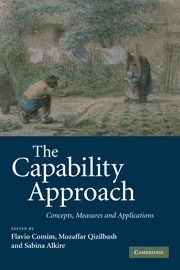Book contents
- Frontmatter
- Contents
- List of figures
- List of tables
- List of contributors
- List of acronyms
- Acknowledgements
- Introduction
- 1 Using the capability approach: prospective and evaluative analyses
- PART I Concepts
- 2 Amartya Sen's capability view: insightful sketch or distorted picture?
- 3 Sen's capability approach and feminist concerns
- 4 Beyond individual freedom and agency: structures of living together in the capability approach
- 5 Does identity matter? On the relevance of identity and interaction for capabilities
- 6 Measuring capabilities
- PART II Measures
- PART III Applications
- Index
- References
2 - Amartya Sen's capability view: insightful sketch or distorted picture?
Published online by Cambridge University Press: 22 September 2009
- Frontmatter
- Contents
- List of figures
- List of tables
- List of contributors
- List of acronyms
- Acknowledgements
- Introduction
- 1 Using the capability approach: prospective and evaluative analyses
- PART I Concepts
- 2 Amartya Sen's capability view: insightful sketch or distorted picture?
- 3 Sen's capability approach and feminist concerns
- 4 Beyond individual freedom and agency: structures of living together in the capability approach
- 5 Does identity matter? On the relevance of identity and interaction for capabilities
- 6 Measuring capabilities
- PART II Measures
- PART III Applications
- Index
- References
Summary
Introduction
It is now more than twenty-five years since the publication of Amartya Sen's Tanner lecture (Sen 1980) in which he first began to develop what we now know as the ‘capability approach’ (CA). The approach has evolved and matured quite considerably over time, and its influence and stature have also grown. It now stands as a, if not the only, major alternative to standard welfare economics. There have also been numerous attempts at applying the CA in different contexts. In some ways the CA has ‘grown up’ and it is an appropriate time to reassess the CA, and to consider its prospects.
Sen's CA gives us a way of thinking about and, in that sense, a ‘view’ of various interrelated subjects, such as the quality of life, justice, and development. It is a view which is, as Sen repeatedly tells us, incomplete, and which is supposed to be open to different accounts of valuation. Sen stops short of completing the picture, rather like an artist who prefers a sketch with a few sharply executed marks to a more fully worked and developed painting. The view Sen gives us might be seen as a rather masterful sketch. Yet by leaving out a great deal of detail and producing a striking effect by giving some things a particular prominence, a sketch can distort reality. So I shall look at the view Sen ‘draws’ and ask: is this view an insightful sketch or a distorted picture?
- Type
- Chapter
- Information
- The Capability ApproachConcepts, Measures and Applications, pp. 53 - 81Publisher: Cambridge University PressPrint publication year: 2008
References
- 14
- Cited by



